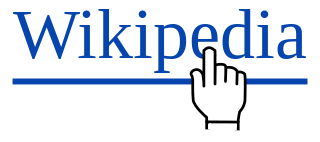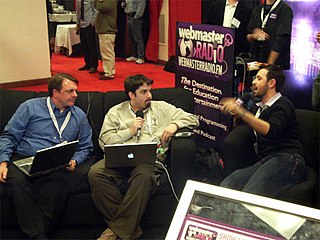Meta elements are tags used in HTML and XHTML documents to provide structured metadata about a Web page. They are part of a web page's head section. Multiple Meta elements with different attributes can be used on the same page. Meta elements can be used to specify page description, keywords and any other metadata not provided through the other head elements and attributes.
Search engine optimization (SEO) is the process of improving the quality and quantity of website traffic to a website or a web page from search engines. SEO targets unpaid traffic rather than direct traffic or paid traffic. Unpaid traffic may originate from different kinds of searches, including image search, video search, academic search, news search, and industry-specific vertical search engines.
Website promotion is the continuing process used by webmasters to improve content and increase exposure of a website to bring more visitors. Many techniques such as search engine optimization and search engine submission are used to increase a site's traffic once content is developed.

The anchor text, link label or link text is the visible, clickable text in an HTML hyperlink. The term "anchor" was used in older versions of the HTML specification for what is currently referred to as the a element, or <a>. The HTML specification does not have a specific term for anchor text, but refers to it as "text that the a element wraps around". In XML terms, the anchor text is the content of the element, provided that the content is text.
Search marketing is the process of acquiring traffic or customers via search engines such as Google, Bing, Yahoo and others. Search marketing generally involves two disciplines: SEO and SEM. Originally called “search engine marketing,” the shorter phrase “search marketing” is now often used as the umbrella term over SEO and SEM. The longer phrase "search engine marketing" — or SEM — is now typically used to describe paid search activities.
Search engine marketing (SEM) is a form of Internet marketing that involves the promotion of websites by increasing their visibility in search engine results pages (SERPs) primarily through paid advertising. SEM may incorporate search engine optimization (SEO), which adjusts or rewrites website content and site architecture to achieve a higher ranking in search engine results pages to enhance pay per click (PPC) listings and increase the Call to action (CTA) on the website.
Search Engine Watch (SEW) provides news and information about search engines and search engine marketing.
An SEO contest is a prize activity that challenges search engine optimization (SEO) practitioners to achieve high ranking under major search engines such as Google, Yahoo, and MSN using certain keyword(s). This type of contest is controversial because it often leads to massive amounts of link spamming as participants try to boost the rankings of their pages by any means available. The SEO competitors hold the activity without the promotion of a product or service in mind, or they may organize a contest in order to market something on the Internet. Participants can showcase their skills and potentially discover and share new techniques for promoting websites.
nofollow is a setting on a web page hyperlink that directs search engines not to use the link for page ranking calculations. It is specified in the page as a type of link relation; that is: <a rel="nofollow" ...>. Because search engines often calculate a site's importance according to the number of hyperlinks from other sites, the nofollow setting allows website authors to indicate that the presence of a link is not an endorsement of the target site's importance.
Social media optimization (SMO) is the use of a number of outlets and communities to generate publicity to increase the awareness of a product, service brand or event. Types of social media involved include RSS feeds, social news, bookmarking sites, and social networking sites such as Facebook, Instagram, Twitter, video sharing websites, and blogging sites. SMO is similar to search engine optimization (SEO) in that the goal is to generate web traffic and increase awareness for a website. SMO's focal point is on gaining organic links to social media content. In contrast, SEO's core is about reaching the top of the search engine hierarchy. In general, social media optimization refers to optimizing a website and its content to encourage more users to use and share links to the website across social media and networking sites.
Search Engine Strategies (SES) is a conference series focused on search engine marketing and search engine optimization.

Barry Schwartz is a blogger who writes about search engines and search engine marketing. Schwartz is the founder and currently the editor of Search Engine Roundtable, an online news site covering the search engines and search engine marketing. He also is the CEO & President of RustyBrick, Inc., a New York–based web development company, and a news editor at Search Engine Land, a search engine news site founded by Danny Sullivan. Previously, Schwartz was a writer for Search Engine Watch. He also moderates online and offline panels at Search Engine Watch, Cre8asite Forums and WebmasterWorld's PubCon.

In geomarketing and internet marketing, geotargeting is the method of delivering different content to visitors based on their geolocation. This includes country, region/state, city, metro code/zip code, organization, IP address, ISP, or other criteria. A common usage of geotargeting is found in online advertising, as well as internet television with sites such as iPlayer and Hulu. In these circumstances, content is often restricted to users geolocated in specific countries; this approach serves as a means of implementing digital rights management. Use of proxy servers and virtual private networks may give a false location.
Article spinning is a writing technique used in search engine optimization (SEO), and other applications, which creates what deceitfully appears to be new content from what already exists. Content spinning works by replacing specific words, phrases, sentences, or even entire paragraphs with any number of alternate versions, in order to provide a slightly different variation with each spin — also known as Rogeting. This process can be completely automated or written manually as many times as needed. Early content produced through automated methods often resulted in articles which were hard or even impossible to read. However, as article-spinning techniques were refined they became more sophisticated, and can now result in readable articles which, upon cursory review, can appear original.
In the field of search engine optimization (SEO), link building describes actions aimed at increasing the number and quality of inbound links to a webpage with the goal of increasing the search engine rankings of that page or website. Briefly, link building is the process of establishing relevant hyperlinks to a website from external sites. Link building can increase the number of high-quality links pointing to a website, in turn increasing the likelihood of the website ranking highly in search engine results. Link building is also a proven marketing tactic for increasing brand awareness.
Covario, Inc. was an American search marketing agency and technology firm based in San Diego, California. The company specialized in international search engine marketing services and provided software tools for SEO, paid search, social media marketing, analytics, and local search optimization. Its customer base included technology, consumer electronics, financial services, retail, ecommerce, media, entertainment, publishing, and consumer packaged goods organizations. Covario was acquired by the Dentsu Aegis Network in September 2014, and combined with iProspect, the network's performance marketing arm, in early 2015.
Hummingbird is the codename given to a significant algorithm change in Google Search in 2013. Its name was derived from the speed and accuracy of the hummingbird. The change was announced on September 26, 2013, having already been in use for a month. "Hummingbird" places greater emphasis on natural language queries, considering context and meaning over individual keywords. It also looks deeper at content on individual pages of a website, with improved ability to lead users directly to the most appropriate page rather than just a website's homepage.
Google Search, offered by Google, is the most widely used search engine on the World Wide Web as of 2023, with over eight billion searches a day. This page covers key events in the history of Google's search service.

This page provides a full timeline of web search engines, starting from the WHOis in 1982, the Archie search engine in 1990, and subsequent developments in the field. It is complementary to the history of web search engines page that provides more qualitative detail on the history.
UnGagged is a search engine optimization and digital marketing conference. The purpose of the semi-annual event is to provide a platform for speakers to present uncensored content to audiences behind closed doors without recordings. UnGagged is an international event, but to date all of the presentations, media and related content has been produced in the English language.




